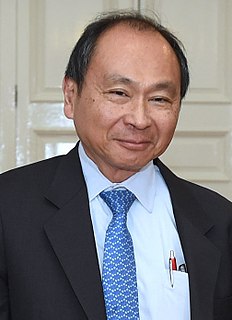A Quote by John Naisbitt
The economic borderlines of our world will not be drawn between countries, but around Economic Domains. Along the twin paths of globalization and decentralization, the economic pieces of the future are being assembled in a new way. Not what is produced by a country or in a country will be of importance, but the production within global Economic Domains, measured as Gross Domain Products. The global market demands a global sharing of talent. The consequence is Mass Customization of Talent and education as the number one economic priority for all countries
Quote Topics
Along
Around
Being
Between
Consequence
Countries
Country
Decentralization
Demands
Domain
Drawn
Economic
Education
Future
Global
Global Market
Globalization
Gross
Importance
Market
Mass
Measured
New
New Way
Number
Our
Our World
Paths
Pieces
Priority
Produced
Production
Products
Sharing
Talent
Twin
Way
Will
Within
World
Related Quotes
If we start thinking simply nationally, and we start having policies that try and restrict the benefits only within our borders, and try and implement protectionist measures as a consequence, this will not have the effect we need to have on the global economy. And that's ultimately the global economy that's pulling most of us down, particularly countries like Canada, that aren't the source of these current economic troubles.
What Asia's postwar economic miracle demonstrates is that
capitalism is a path toward economic development that is potentially
available to all countries. No underdeveloped country in the
Third World is disadvantaged simply because it began the growth
process later than Europe, nor are the established industrial powers
capable of blocking the development of a latecomer, provided
that country plays by the rules of economic liberalism.
The specter of climate change threatens worsening natural disasters, rapid urbanization, forced migration, and economic hardship for the most vulnerable. Despite significant global advances, inability to effectively address epidemics and health emergencies still prevail and continuously threaten global health security and economic development.
It is my hypothesis that the fundamental source of conflict in this new [post-Cold-War] world will not be primarily ideological or primarily economic. The great divisions among humankind and the dominating source of conflict will be cultural. Nation states will remain the most powerful actors in world affairs, but the principal conflicts of global politics will occur between nations and groups of different civilizations. The clash of civilizations will dominate global politics. The fault lines between civilizations will be the battle lines of the future.



































